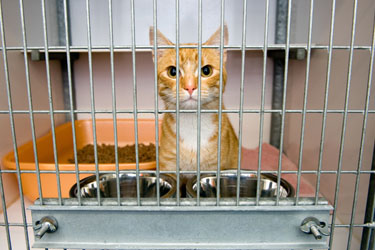Encouraging Clients to Adopt Overlooked Shelter Animals

The number of animals that end up in a shelter is staggering. According to The American Society for the Prevention of Cruelty to Animals (ASPCA), every year, there are approximately 3.3 million dogs and 3.2 million cats that enter a shelter in need of a good and loving forever home. That’s 6.5 million animals. Every year.
Why Animals End up in Shelters
When you walk into a shelter to adopt a pet, the animals that you see are there for a variety of reasons. For instance, they may be in the shelter because they are:
- Strays. Animals that are often found wandering through a community and are brought in with the hopes that they will end up in a good home.
- Cruelty cases. Unfortunately many animals come to the shelters after being removed from bad situations, such as hoarding cases, puppy mills, dog-fighting rings, and cruelty cases.
- Surrendered animals. These animals are brought to the shelter by their owners, for reasons that may relate to:
- Lifestyle change: Divorce, job loss, loss of home
- Financial difficulties
- Health of the animal: The pet has health needs and expenses the owner can’t afford
- Death of owner
- Illness or hospitalization of owner. Pets are often surrendered to a shelter when the owner becomes critically ill, is faced with spending a long period of time in the hospital, or has been admitted to a nursing home.
- Allergies: Cats, especially, are brought to a shelter when someone within the home suffers from an allergy.
- No time: When the owner feels they can’t provide the animal with the time and attention they require.
- New baby: Some new parents feel that the home is no longer the place for a pet once they have a baby.
- Behavioral: For instance, the animal is destructive when left alone, or is difficult to housetrain.
- Size: What once was a cute puppy is now a huge dog.
With so many animals ending up in shelters, some are bound to have a more difficult time being adopted than others.
Overlooked Pets
All pets deserve a good home with a loving family. While many do find this happiness, some animals are repeatedly overlooked because they have traits that seem to make them less adoptable. The following types of animals are often ignored and may spend the rest of their lives in a shelter.
Seniors
Older animals may not have as much time left, but they still have a lot to offer! Senior animals have already learned how to socialize and get along with others and are often:
- Well-behaved
- House-trained
- Experts at walking on a leash
- Even-tempered and relaxed
- Calm around children.
When clients are thinking about adopting a senior, they should keep in mind that a noisy shelter environment is often unsettling for older animals, especially those who have spent their entire life with the same family. When senior animals are left at a shelter they often become depressed, but when in their new home and given some time and attention, they recover.
Here’s some advice on how to talk to your clients about adopting a senior pet
Special Needs
Shelter animals with special needs are also often overlooked. These are the animals that may be, for instance:
- Deaf
- Blind
- Handicapped
- Diagnosed with a chronic illness.
When considering them for a family pet, potential adopters should be reminded that humans are the ones that view them as having a physical limitation. Special-needs animals are highly resilient and quickly learn to adapt to their needs.
Timid Personality
Not everyone needs a bouncing, jubilant, playful pet. Sometimes the one that would best fit a family is quiet and just wants to be a lap baby, but these are the animals that are passed by. Often hanging out at the back of the pen, quiet animals may seem shy and unapproachable, but they could just be scared and stressed by their environment. Once taken home, these reserved animals will often become more outgoing, playful, and will seek your attention.
You Can Make a Difference!
As a veterinarian, your encouragement can make the difference in the lives of often-overlooked animals. During Adopt a Less Adoptable Pet Week the third week in September and throughout the year, you can open your clients’ minds to the possibility of adopting one of these animals.
How?
- Link to petfinder.com on your website.
- Provide information like that above to encourage clients to consider less adoptable pets.
- Work with a local shelter to post flyers inside your clinic or include information in your newsletter.
- Offer your clients these shelter pet adoption tips.
Contact your Covetrus Animal Health representative for additional information to encourage pet adoption at 855.724.3461.
Sources:
https://www.aspca.org/animal-homelessness/shelter-intake-and-surrender
http://www.huffingtonpost.com/2014/09/23/adopt-a-less-adoptable-pet_n_5863802.html
http://www.petful.com/animal-welfare/senior-dogs-left-at-shelters/
https://www.petfinder.com/less-adoptable-pet-week/
Need Regulatory Assistance
If you need help with regulatory or licensing issues, we're happy to help. We have a wide variety of resources to help you when issues arise.

Careers
Are you looking for a place to let your talents shine? At Covetrus, we help our practitioner customers better serve their patients and take pride in providing the best customer experience possible. Search our open positions to see our available opportunities.
Newsletter
Stay current with what’s going on with Covetrus, subscribe to receive our newsletter and email communications. Subscribers will receive the latest information in practice management, sales and marketing, animal health, and more.


Leave a comment